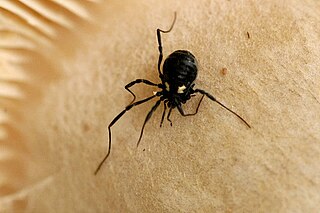Related Research Articles

The Opiliones are an order of arachnids, colloquially known as harvestmen, harvesters, harvest spiders, or daddy longlegs. As of July 2024, over 6,650 species of harvestmen have been discovered worldwide, although the total number of extant species may exceed 10,000. The order Opiliones includes five suborders: Cyphophthalmi, Eupnoi, Dyspnoi, Laniatores, and Tetrophthalmi, which were named in 2014.
Dyspnoi is a suborder of harvestmen, currently comprising 43 extant genera and 356 extant species, although more species are expected to be described in the future. The eight families are currently grouped into three superfamilies: the Acropsopilionoidea, Ischyropsalidioidea, and Troguloidea.

Rilaena triangularis is a species of the harvestman family Phalangiidae. It is sometimes considered to be in the genus Paraplatybunus, in the subfamily Platybuninae.
Sabacon is a genus of the monotypic harvestman family Sabaconidae, with 59 species.

Nipponopsalididae is a family of harvestmen with three described species in one genus, Nipponopsalis, which is found in East Asia.

Ischyropsalididae is a family of harvestmen with 35 described species in 3 genera, found in Europe and North America.

The Nemastomatidae are a family of harvestmen with about 170 described species in 16 recent genera. Several fossil species and genera are known.

Sandokanidae is a family of harvestmen in the suborder Laniatores, formerly referred to as Oncopodidae
Oncopus is a genus of moths in the family Geometridae first described by Gottlieb August Wilhelm Herrich-Schäffer in 1855. It is a senior homonym of OncopusThorell, 1876, but since this latter genus of opilionids has been much more used in the literature, it has been proposed to the ICZN in 2006 to suppress the Lepidoptera name. The proposal was refused in 2008.
Konrad Thaler was an Austrian arachnologist.
Cladolasma, is a genus of harvestmen belonging to the family Nemastomatidae. The genus is monotypic containing a single species Cladolasma parvulum. They are endemic to Japan, with records in Ehime and Tokushima Prefectures. The genus was described by Seisho Suzuki, with the type species Cladolasma parvulum Suzuki, 1963, subsequently revised to Dendrolasma parvulum in Suzuki (1974), but later restored as a valid genus.
Ceratolasma is a genus of harvestmen in the family Ischyropsalididae, found in the Pacific Northwest. There is one described species in Ceratolasma, C. tricantha.

Dendrolasma mirabile is a species of harvestman in the family Nemastomatidae. It is found in North America, in the Pacific Northwest of the USA and Canada. The species was described by Nathan Banks, who reported the original specimen from USA, "Washington State", consistent with later records over a wider geographic range.

Ortholasmatinae is a subfamily of harvestmen in the family Nemastomatidae with 27 described species in 7 genera. They are found in temperate and often mountainous regions of the Northern Hemisphere.

Nemastomatinae is a subfamily of harvestmen with over 125 described species in 19 (extant) genera. They are usually found in temperate regions.

Wilhelmus Egbertus Antonius Janssen, better known as Father Chrysanthus OFMCap, was a Dutch priest and biology teacher. He was known for his studies in arachnology. Initially he was concerned with the spiders of the Netherlands but he became a specialist on New Guinea spiders. Two spider species were named in his honor following his death.
Asiolasma is a genus of harvestmen in the family Nemastomatidae with six described species . The species are found in Southeast Asia, namely China, Vietnam and Thailand. Some species are treated under other genera in Schönhofer (2013).

Jochen Martens is a German zoologist, whose areas of expertise are primarily in ornithology and arachnology. He taught at the Johannes Gutenberg University Mainz from 1976 to 2012 and is considered a pioneer in the use of bioacoustics for studying the evolution of songbirds and one of the most recognized researchers in the field of Opiliones (harvestmen).